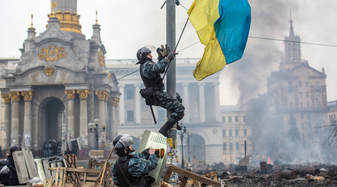 Following on from my previous post, I have been reading lately about Ukraine’s 2014 Euromaidan Revolution. One book I have re-read is Andrey Kurkov’s Ukraine Diaries: Dispatches from Kiev, a fascinating first-hand account of the events, written by a local writer living close to the Maidan, Kiev’s Independence Square, which is at the heart of the action. From his apartment, Kurkov can smell the burning barricades and hear the sounds of grenades and gunshot. The diary portrays the horrific violence perpetrated against many innocent victims, the powerful sentiments of injustice felt by the protestors and the fears generated by an ever-changing political climate, interspersed with the mundane day-to-day trials and tribulations of family life. It also sheds light on Russia’s annexation of Crimea in March of that year and on the ongoing conflict in the Donbas of eastern Ukraine, the heartland of then-president Viktor Yanukovych. This week in 2014 marked the climax of events in Kiev. On 18 February, violence broke out during a peaceful march on parliament in which protestors demanded a change to the constitution to limit the powers of the president. “And then, about two o’clock, the situation suddenly worsened. Activists invaded the Party of Regions headquarters and set fire to it. The Berkut [riot police] threw grenades and fired rubber bullets, from the ground and from the rooftops,” Kurkov writes in his diary entry for that day. Still on 18 February, he mulls: “What will happen next? The dissolution of parliament, the announcement of new elections in six months, the lifting of parliamentary immunity for opposition deputies and their arrests? This country has never had such a stupid president before, capable of radicalising one of the most tolerant populations in the world!” The following day, 19 February, he writes “In Kiev, they are counting the dead, the wounded and the disappeared…The hospitals are overflowing right now. But many of the wounded are in hiding, from their friends as well as from strangers. They are afraid of going to hospital because the police have often abducted injured protesters from there to take them to the station, without offering them any medical care.” And here is an insight into the sharp divide between the European-oriented western Ukraine that Kurkov inhabits and the Russian-dominated east of the country exemplified by the industrial city of Donetsk: “Hatred is overflowing. It is born from a simple dislike of a Donetskian government that is both strange and foreign; a dislike that, by perhaps growing too fast, has become hatred, and is currently raging through western Ukraine, in Odessa, Cherkasy and other places. Meanwhile Crimea is once again calling on Russia to take it back.” The following day, 20 February, Kurkov writes: “Today a lecturer from the Catholic University in Lviv was killed, along with several dozen other people. Snipers are shooting even at young nurses…There are rumours everywhere, each one more disturbing than the last, but the reality in this country is already horrifying: today, in St Michael’s Square, two policemen were killed. Why? Who needs that? It is obviously the hand of Moscow, pushing us into a state of war…”. And on the 21st: “In Kharkiv, the regional governor is assembling a congress of deputies from the south and east of Ukraine to study the possibility of separating from Kiev. The country is trembling all over – it is close to being torn apart – but Yanukovych doesn’t see this.” On 22 February Yanukovych fled, having earlier that day signed an agreement with the opposition to make the constitutional changes demanded by the opposition and setting out plans for a presidential election by the end of the year. The diaries continue through to late April, by which time Russia had annexed Crimea following a hastily arranged referendum in March and the conflict in the east of the country was beginning. Russians were infiltrating eastern Ukraine to organise pro-Russian rallies, their troops and military apparel massing at the border, all of which President Putin denied, and armed separatists were occupying government buildings. “What frightens me is a possible Russian intervention in the east and south of the country. It would be wonderful not to have to think about the possibility of a war, but a day has not passed without that possibility crossing my mind,” Kurkov writes on 24 March. That war has gone on to take the lives of more than 10,000 people. More than 2 million have been made homeless. Ukraine Diaries: Dispatches from Kiev by Andrey Kurkov is published by Harvill Secker, London, 2014.
0 Comments
Leave a Reply. |
Keeping stories aliveThis blog aims to discuss historical events relating to the Jewish communities of Ukraine, and of Eastern Europe more widely. As a storyteller, I hope to keep alive stories of the past and remember those who told or experienced them. Like so many others, I am deeply troubled by the war in Ukraine and for the foreseeable future, most articles published here will focus on the war, with an emphasis on parallels with other tumultuous periods in Ukraine's tragic history. Archives
March 2024
Categories
All
|
 RSS Feed
RSS Feed
